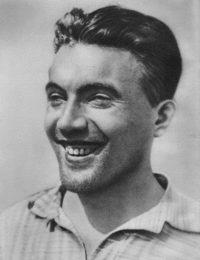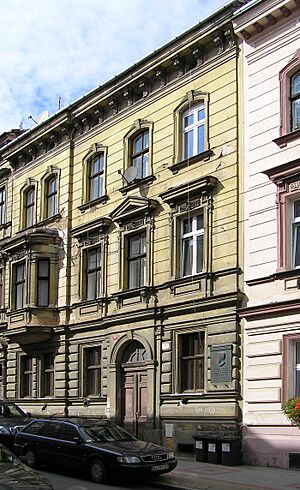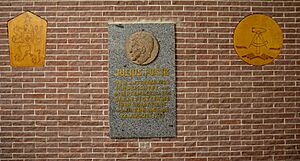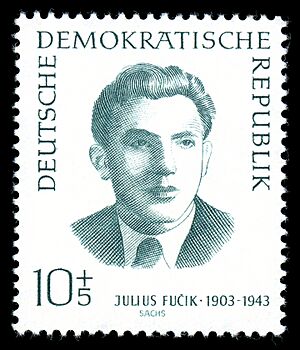Julius Fučík (journalist) facts for kids
Quick facts for kids
Julius Fučík
|
|
|---|---|

Julius Fučík
|
|
| Born | Julius Jaroslav Fučik 23 February 1903 Prague, Austria-Hungary |
| Died | 8 September 1943 (aged 40) Plötzensee Prison, Berlin, Nazi Germany |
| Occupation | Journalist and literary critic |
| Citizenship | Austrian, Czechoslovak |
| Alma mater | Faculty of Arts, Charles University |
| Notable works | Notes from the Gallows |
| Notable awards | Honorary International Peace Prize (1950) |
| Spouse | Gusta Fučíková |
Julius Fučík (born February 23, 1903 – died September 8, 1943) was a Czech journalist, writer, and critic. He was also an active member of the Communist Party of Czechoslovakia. During World War II, he bravely joined the anti-Nazi resistance.
Because of his work against the Nazis, the Gestapo (the Nazi secret police) arrested him in Prague. He was later executed in Berlin. While in prison, Fučík secretly wrote down his experiences during interrogations. These writings were smuggled out and published after the war as Notes from the Gallows. This book made Fučík a powerful symbol of fighting against unfair rule.
Contents
Early Life and Interests
Julius Fučík was born in Prague into a working-class family. His father worked with steel. His uncle, also named Julius Fučík, was a famous composer.
In 1913, his family moved to Plzeň (Pilsen). There, he attended a state high school. Even as a twelve-year-old, he dreamed of starting his own newspaper called Slovan (The Slav). He was very interested in both politics and literature from a young age. As a teenager, he often performed in local amateur theater plays.
Journalism and Political Work
In 1920, Fučík began studying in Prague. He joined the Czechoslovak Social Democratic Workers' Party. This led him to become involved with a group that later formed the Communist Party of Czechoslovakia (CPC) in May 1921. Fučík started by writing about culture for the CPC newspaper in Plzeň.
After finishing his studies, Fučík became an editor for a literary newspaper called Kmen ("Stem"). Within the CPC, he was in charge of cultural activities. He joined a group of artists and writers called Devětsil in 1926. In 1929, he helped create a more politically focused group called Left Front.
He also wrote for the magazine Tvorba ("Creation") and the main CPC newspaper Rudé právo ("Red Right"). During this time, the Czechoslovak Secret Police arrested him several times. He managed to avoid an eight-month prison sentence in 1934.
Fučík visited the Soviet Union twice. In 1930, he stayed for four months and wrote a book called In a Land, Where Tomorrow is Already Yesterday. In this book, he described the Soviet Union in a very positive way. He supported their efforts to organize farms together (collectivization) and build up industries. He visited again for two years starting in 1934.
In 1938, Fučík married Augusta Kodeřičová, who later became known as Gusta Fučíková.
Resistance and Arrest
After the Munich Conference in 1938, the government in Prague banned the CPC. The party then had to operate secretly. When Nazi Germany invaded Czechoslovakia in March 1939, Fučík moved to his parents' home. He wrote for regular newspapers about history and literature. He also began working for the underground CPC.
In 1940, the Gestapo started looking for him because of his work with the CPC. So, he moved back to Prague. From early 1941, he was part of the CPC's Central Committee. He helped print and distribute secret leaflets. He also tried to publish the Communist Party newspaper Rudé Právo regularly.
On April 24, 1942, the Gestapo arrested Fučík and six other people in Prague. This arrest was likely by chance during a police raid. Fučík had two guns but did not use them.
Trial and Execution
In May 1943, Fučík was taken to Germany. He was held in Bautzen for over two months, then moved to Berlin. On August 25, 1943, he faced trial in Berlin. The court, known as the Volksgerichtshof, was led by a very strict judge named Roland Freisler.
Fučík was found guilty of political activities against the state. He was sentenced to death along with Jaroslav Klecan, who was arrested with him. Julius Fučík was executed two weeks later, on September 8, 1943. He died in Plötzensee Prison in Berlin.
After the war, his wife, Gusta Fučíková, found all his writings from prison. She had also been held in a Nazi concentration camp. With help from the CPC, she edited and published his writings in 1947. The book was called Notes from the Gallows. It became very popular, especially after the Communist Party took power in Czechoslovakia in 1948. The book has been translated into at least 90 languages.
A Symbol of Resistance
The Communist Party used Julius Fučík and his book as a symbol. He became one of the most important figures for the party. His book was required reading in schools. By age 10, most students in communist Czechoslovakia knew about Fučík's life and work.
Fučík became a national hero. His picture was shown at political meetings. His wife, Gusta Fučíková, was given an important role in the Party. She led a women's organization for many years.
Many places were named after Fučík. These included a large entertainment park in Prague and a city theater in Jablonec nad Nisou. A factory in Brno and many streets and squares also carried his name. In December 2022, a street named after Julius Fučík in Kyiv, Ukraine, was renamed to Karel Čapek street.
In 1955, writer Milan Kundera wrote a story called Poslední máj (The Last May). It imagined a meeting between Fučík and his Nazi questioners.
A Soviet and later Russian ship was named the MV Yulius Fuchik. The composer Luigi Nono also wrote a musical piece based on Notes from the Gallows.
See Also
 In Spanish: Julius Fučík (periodista) para niños
In Spanish: Julius Fučík (periodista) para niños
- Julius Fučík (1872–1916), a famous composer and Julius Fučík's uncle.
 | William L. Dawson |
 | W. E. B. Du Bois |
 | Harry Belafonte |




